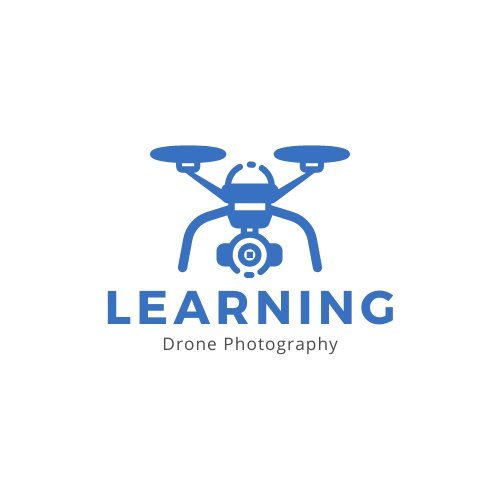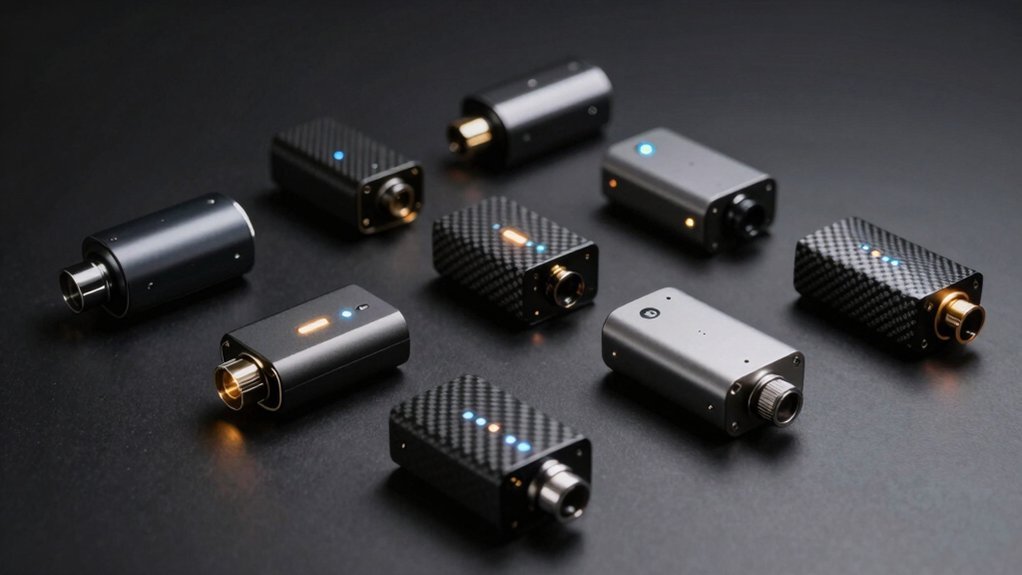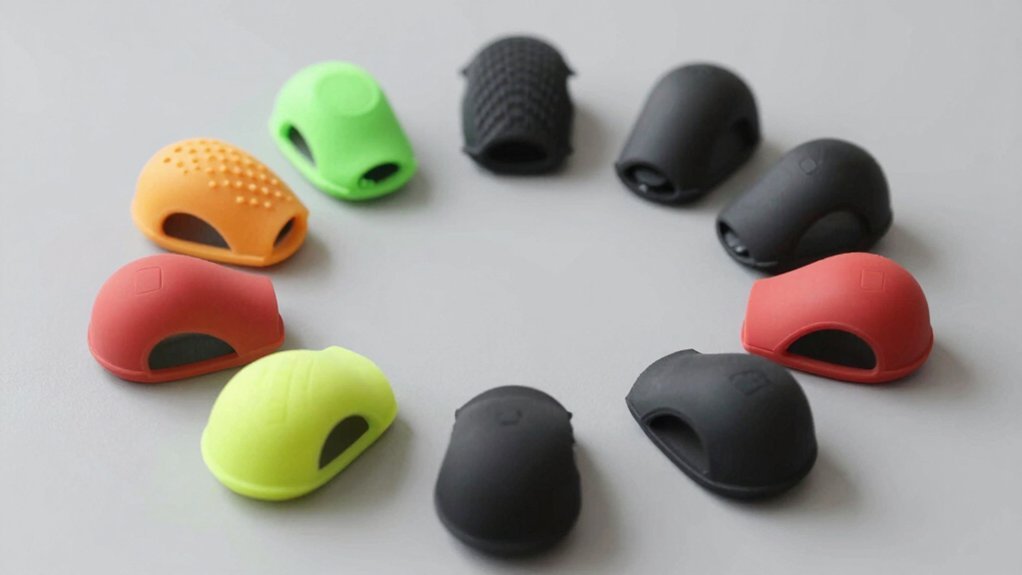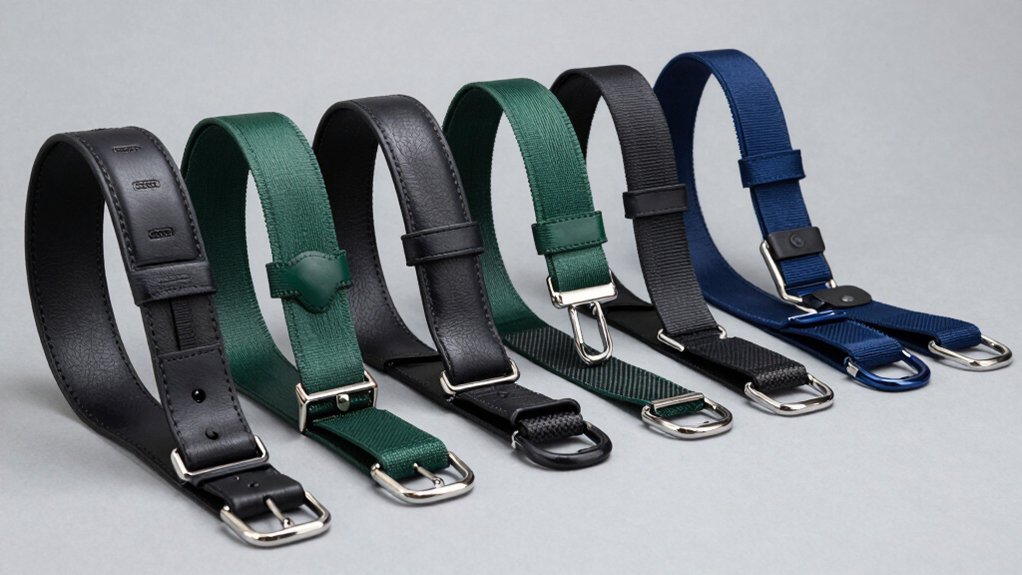If you've invested in a drone, you'll quickly discover that battery charging can make or break your flying experience. The right rapid charger doesn't just power up your batteries faster—it protects your investment and maximizes your time in the air. From multi-battery charging stations to compact USB options, today's market offers solutions for every need and budget. Let's explore six proven chargers that'll keep your drone ready for takeoff whenever adventure calls.
Top Race RC Drone Battery Charger with LED Indicator (1-6S AC/DC 80W)
The Top Race RC Drone Battery Charger stands out as an ideal solution for drone enthusiasts who need to charge multiple batteries simultaneously. With its 80W AC/DC capacity, you'll efficiently charge up to 5 batteries at once through independent ports.
You'll appreciate the straightforward LED indicator system – red lights show active charging, while lights off signal completion. The charger's versatile design works with 1-6S batteries and various remote-controlled devices. Users consistently praise the snug terminal fit and reliable performance. While there are rare reports of malfunctions, this charger delivers on its promise of fast, efficient charging for your drone battery needs.
Best For: Drone enthusiasts and RC hobbyists who need to charge multiple batteries simultaneously and want a versatile, reliable charging solution for various remote-controlled devices.
Pros:
- Can charge up to 5 batteries simultaneously, saving significant time
- Clear LED indicator system shows charging status for each port
- Versatile compatibility with 1-6S batteries and various RC devices
Cons:
- Occasional reports of unit malfunctions
- Need to verify connector compatibility before purchase
- Limited user feedback on long-term durability
FPVERA Drone Batteries and USB Charger for SYMA X5
Drone enthusiasts seeking reliable power solutions for SYMA X5 models will find FPVERA's battery and charger combo particularly appealing. You'll get two 3.7V 650mAh LiPo batteries with a versatile USB charger that works with power banks, car outlets, and computers.
The batteries measure 44 x 25 x 9mm and feature built-in protection IC for safe charging. With a 4.3-star rating from 700 users, these batteries deliver extended flight times and compatibility across multiple drone models, including SYMA X5C, X5SC, X5SW, and WLtoys V252. If you're not satisfied, FPVERA offers 24-hour replacements or refunds.
Best For: Drone hobbyists who own SYMA X5 series or compatible models and need reliable replacement batteries with convenient USB charging options.
Pros:
- Versatile USB charging compatibility with multiple power sources
- Built-in protection IC for enhanced charging safety
- Compatible with multiple drone models beyond just SYMA X5 series
Cons:
- Some users report shorter-than-expected charge duration
- Connection issues reported by some customers
- Relatively high price point compared to generic alternatives
E-outstanding Battery Balance Charging Line for RC Aircraft Drone
Pilots seeking an affordable charging solution will appreciate E-outstanding's versatile balance charging line, which features both USB to XH2.54 and XH2.54 to JST connectors. The charging line's specialized design guarantees proper charging of 3.7V lithium batteries commonly used in RC aircraft and drones like the X5C and 818a models.
You'll find this charging line particularly useful if you're operating multiple types of drones with different battery connectors. The dual connector system eliminates the need for separate chargers, making it a practical choice for both hobbyists and professional drone operators who want to streamline their charging equipment.
Best For: RC drone enthusiasts who need a versatile charging solution for multiple battery types and want to minimize charging equipment.
Pros:
- Compatible with multiple connector types (USB to XH2.54 and XH2.54 to JST)
- Cost-effective alternative to buying multiple chargers
- Specifically designed for common 3.7V lithium batteries used in popular drone models
Cons:
- Limited to 3.7V batteries only
- May not be compatible with all drone models or battery types
- No built-in safety features mentioned for overcharging protection
3.7V Lipo Battery Charger for RC Toys (2 Pack)
Versatile and budget-friendly, this dual-pack USB charger set caters perfectly to RC enthusiasts with multiple 3.7V Li-ion powered toys. You'll appreciate its broad compatibility with RC cars, drones, boats, and other devices using SM-2P plug batteries ranging from 500mAh to 2000mAh.
The charger's smart IC circuit board keeps your batteries safe with extensive protection against over-voltage, overload, and overheating. You can easily monitor charging status through the indicator lights – green while charging, red when complete. At just 20g each and offering 0.5A output from a 5V/2A input, these chargers deliver reliable performance in a compact package.
Best For: RC toy enthusiasts who own multiple 3.7V Li-ion powered devices and need reliable, safe charging solutions for their diverse collection of remote-controlled vehicles and toys.
Pros:
- Comes as a cost-effective 2-pack with comprehensive safety features including overcharge and overheat protection
- Compatible with a wide range of RC toys and battery capacities (500mAh to 2000mAh)
- Clear charging status indication through LED lights and lightweight portable design
Cons:
- Limited to only 3.7V batteries with SM-2P plug type
- Relatively slow charging speed at 0.5A output
- Connection points may be fragile and require careful handling based on customer feedback
Sea Jump 5PCS 3.7V 400mAh Li Battery with Charger for Drones
Flying enthusiasts seeking reliable power for their SYMA, H99W, and other compatible drones will find an efficient solution in the Sea Jump 5PCS battery kit. You'll get five 3.7V 400mAh Li batteries and a five-in-one charger that lets you power up all batteries simultaneously.
Each battery delivers about 8 minutes of flight time, and with five batteries, you'll enjoy extended sessions. While the charger's LED indicators can be finicky, you can prevent issues by using a charging block. The compact batteries (0.31 x 0.79 x 1.42 inches) are lightweight at just 0.317 ounces, making them perfect for your drone's performance needs.
Best For: Drone enthusiasts who own compatible SYMA, H99W, H31, or similar models and need a reliable, multi-battery solution for extended flight sessions.
Pros:
- Includes five batteries and a multi-charging system for continuous flight sessions
- Compact and lightweight design optimizes drone performance
- Strong value with high customer satisfaction rating (4.5/5 from 1,195 reviews)
Cons:
- Charger's LED indicators can be unreliable
- Each battery only provides 8 minutes of flight time
- Some users report inconsistent battery lifespan
Lipo Battery Balance RC Charger 80W (H B6)
Drone enthusiasts seeking a reliable multi-chemistry charger will find the H B6 80W an excellent choice for their battery needs. This versatile 80W charger handles everything from LiPo and Li-ion to NiMH and NiCd batteries, supporting up to 6 cells for lithium-based chemistries.
You'll appreciate its thorough safety features, including reverse polarity protection and independent cell balancing. The LCD screen lets you monitor charging status, while multiple connector options (XT-60, JST, Deans) guarantee compatibility with your batteries. Despite some reported heating issues, the H B6's fireproof shell and 12-month warranty provide peace of mind for your charging needs.
Best For: RC hobbyists and drone enthusiasts who need a versatile charger capable of handling multiple battery types and want advanced features like cell balancing and safety protections.
Pros:
- Compatible with multiple battery chemistries and supports up to 6 cells for lithium batteries
- Comprehensive safety features including reverse polarity protection and independent cell balancing
- Versatile connector options (XT-60, JST, Deans) and includes fast charging capabilities
Cons:
- Reports of overheating issues during extended use
- Instruction manual could be clearer and may require supplemental video tutorials
- Some users experienced safety concerns and potential fire hazards
Factors to Consider When Choosing Rapid Chargers for Drone Batteries
When you're looking for a rapid drone battery charger, you'll need to evaluate several critical factors to make the right choice. Your charger must match your battery's chemistry and voltage while delivering sufficient power output through the appropriate charging ports. Beyond these technical requirements, you'll want to take into account built-in safety features like overcharge protection and whether the charger's size and portability suit your needs.
Battery Compatibility Features
Three critical battery compatibility features deserve careful attention when selecting a rapid charger for your drone equipment. First, you'll need to match your battery's chemistry type, as LiPo, Li-ion, and NiMH batteries each require specific charging protocols to function safely and efficiently.
Next, check the cell count compatibility of your charger. You'll want to verify it can handle your battery's configuration, whether you're using 1-6S or larger cell counts. Don't forget to confirm the connector types – your charger should support common formats like XT-60, JST, or Deans that match your batteries.
For enhanced safety and performance, look for chargers with independent charging ports that let you power up multiple batteries simultaneously. These features, combined with overcharge protection and temperature monitoring, will help protect your investment.
Power Output Requirements
Power output specifications stand at the forefront of selecting an effective rapid charger for your drone equipment. You'll want to look for chargers that deliver sufficient power, typically around 80W with a maximum current output of 6A, to efficiently charge multiple batteries at once.
When evaluating power requirements, verify your charger can handle the voltage range of your drone batteries. A charger supporting 1-6S batteries offers versatility across different drone models. You'll need independent charging ports if you're planning to charge multiple batteries simultaneously, as this prevents interference between charging cycles. Don't overlook the importance of matching connector types – whether you're using XT-60, JST, or Deans connectors – to maintain secure connections and efficient power transfer. Remember that proper safety features like over-voltage and thermal protection are essential for high-power charging operations.
Safety Protection Systems
Building on proper power specifications, your rapid drone charger must incorporate robust safety protection systems to prevent costly accidents and equipment damage. Look for chargers that feature extensive protection against over-voltage, over-current, and excessive temperatures, as these safeguards help preserve your battery's lifespan and prevent dangerous malfunctions.
Your ideal charger should include reverse polarity protection to guard against incorrect connections, while a smart IC circuit board will continuously monitor and adjust charging parameters for peak performance. Don't overlook the importance of fireproof materials and thermal protection features in the charger's construction. Clear LED indicators are also essential, as they'll help you monitor the charging status and catch potential issues before they become problems.
Charging Port Configuration
While choosing a rapid charger for your drone batteries, proper port configuration stands as a critical factor for seamless compatibility. You'll need to verify whether your batteries use XH2.54 or SM-2P connectors before selecting a charger to guarantee a proper fit.
Look for chargers that offer multiple output ports if you're planning to charge several batteries at once. Each port should display independent status indicators, allowing you to monitor individual charging progress. Your charger should also support various battery configurations, particularly 1-6S LiPo or Li-ion batteries, giving you flexibility across different drone models. When considering power output, an 80W charger will efficiently handle multiple batteries simultaneously. Don't forget to check that the charger includes essential safety features like over-voltage protection to safeguard your batteries during rapid charging.
Portability and Size
Since drone operators often work in various locations, choosing a charger with the right size and portability features can make a significant difference in your field operations. You'll want to look for compact and lightweight models that you can easily pack in your gear bag without adding unnecessary bulk.
Consider chargers that offer multi-battery charging capabilities while maintaining a small footprint. The best portable chargers feature smart design elements like foldable plugs or built-in cables that maximize space efficiency. When evaluating options, pay attention to the balance between power output and physical dimensions – you don't want to sacrifice charging performance for size. Remember that your charger's portability will directly impact your mobility in the field, so prioritize models that combine efficient charging with travel-friendly design features.
Frequently Asked Questions
Can Rapid Charging Reduce the Overall Lifespan of Drone Batteries?
Yes, rapid charging can shorten your drone battery's lifespan. You'll notice reduced capacity and performance over time because fast charging generates more heat and stress on the battery cells, accelerating their degradation.
Are Rapid Chargers Compatible With Batteries From Different Drone Manufacturers?
You'll find that most rapid chargers aren't universally compatible across drone brands. They're usually designed for specific battery models to guarantee safety. It's best to stick with chargers recommended by your drone's manufacturer.
What Safety Features Prevent Overcharging When Using Rapid Chargers?
You'll find built-in safeguards like automatic shutoff, temperature monitoring, and voltage detection in quality rapid chargers. They'll stop charging when batteries reach capacity and prevent heat buildup during the process.
How Do Extreme Temperatures Affect Rapid Charging Performance?
You'll notice reduced charging speeds in extreme temperatures. Cold weather slows ion movement, while heat risks battery damage. For peak performance, you should charge your batteries between 40-85°F (4-29°C) to maintain efficiency.
Can I Use Rapid Chargers With Older Drone Battery Models?
You shouldn't use rapid chargers with older drone batteries unless specifically approved by the manufacturer. Older models lack modern safety features and charging protocols, which could lead to damage or potential safety hazards.
In Summary
You'll find these rapid chargers offer the perfect mix of power, safety, and convenience for your drone batteries. Whether you're choosing the Top Race RC for multiple battery charging or the FPVERA for its safety features, you're making a solid investment. Just remember to match your charger's specifications with your drone's battery type and cell count to guarantee peak performance and longevity.

As educators and advocates for responsible drone use, we’re committed to sharing our knowledge and expertise with aspiring aerial photographers.




Leave a Reply